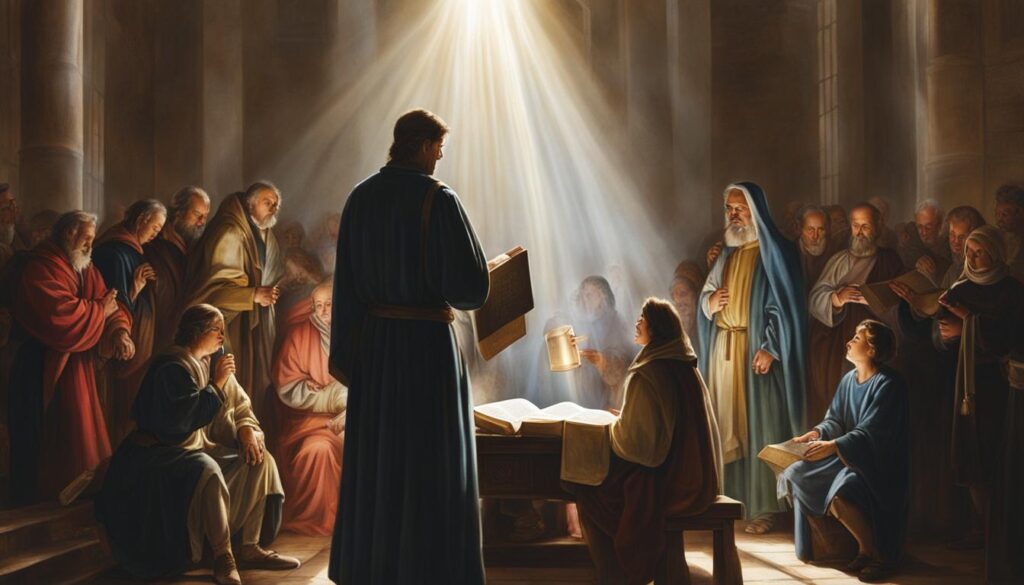Welcome to our in-depth exploration of the question: Are Protestants saved? In this article, we will delve into the complexities of the Protestant belief system and its views on salvation. Join us as we navigate the rich tapestry of faith, theology, and historical context that shape the understanding of salvation within Protestantism.
Key Takeaways:
- Protestant beliefs on salvation vary, with some emphasizing God’s grace and others highlighting human responsibility.
- The Protestant Reformation challenged Catholic teachings on salvation, emphasizing faith in Christ’s sacrifice.
- There is no single, unified view on how Protestants are saved, with diverse interpretations across denominations.
- Protestant views on the afterlife range from immediate presence with Christ to ideas of “soul sleep” or transitional states.
- Contemporary perspectives on Protestant salvation reflect the evolving nature of theological thought within the faith.
The Protestant Belief System on Salvation
Protestant beliefs on salvation encompass a variety of perspectives, reflecting the diverse nature of the Protestant faith. While there is no singular, unified view, certain key themes emerge when exploring the Protestant perspective on salvation.
1. Salvation through faith: A fundamental belief among many Protestants is salvation through faith in Jesus Christ. This emphasis on faith as the pathway to salvation is rooted in the teachings of the Protestant reformers, who challenged the notion that salvation could be earned through good works alone.
2. Grace and personal responsibility: While faith is seen as the primary means of salvation, many Protestants also emphasize the role of God’s grace and human responsibility. They believe that salvation is a gift of God’s unmerited favor, but individuals have a personal responsibility to respond to God’s grace through faith and obedience.
3. Assurance of salvation: Another aspect of the Protestant belief system is the assurance of salvation. Many Protestants hold the view that once someone has genuinely placed their faith in Christ, they are eternally secure in their salvation. This understanding provides believers with confidence and peace in their relationship with God.
While these themes are common within Protestantism, it is important to note that there is diversity within the faith. Different denominations and theological traditions may emphasize certain aspects of salvation more than others, leading to variations in belief and practice. Ultimately, the Protestant view on salvation seeks to reconcile the concepts of God’s grace and human responsibility, affirming faith as the central element in the journey towards eternal life.
The Protestant Reformation and Salvation
The Protestant Reformation, initiated by Martin Luther in 1517, marked a significant shift in the understanding of salvation within Christianity. At the heart of the Reformation was the rejection of certain Catholic teachings and the emphasis on salvation through faith in Christ’s sacrifice rather than through works or traditions. This shift in theological perspective had a profound impact on the development of Protestant Christianity as a distinct branch of the faith.
One of the key beliefs that set the Protestant reformers apart from the Catholic Church was the concept of sola scriptura, or Scripture alone, as the authority for Christian faith and practice. They believed that salvation could be attained by placing one’s faith in the teachings of the Bible, which they regarded as the inspired word of God. This emphasis on personal interpretation of scripture and direct access to God’s word gave individuals a newfound sense of agency in their own salvation.
The Five Solas
- Sola Fide (Faith Alone): Salvation is obtained through faith in Jesus Christ, not by good works or adherence to rituals.
- Sola Scriptura (Scripture Alone): The Bible is the ultimate authority for Christian belief and practice.
- Sola Gratia (Grace Alone): Salvation is a result of God’s grace alone, not by any human effort or merit.
- Sola Christus (Christ Alone): Jesus Christ is the only mediator between God and humanity, and salvation comes through him alone.
- Soli Deo Gloria (To the Glory of God Alone): The ultimate purpose of salvation is to bring glory to God.
The Protestant Reformation not only challenged the existing power structures within the Catholic Church but also led to a diverse range of interpretations on various aspects of salvation. Multiple Protestant denominations emerged, each with its own unique perspectives and doctrines. This diversity is still evident today, with different Protestant groups holding varying beliefs on the nature of salvation, the role of faith and works, and the eternal destiny of believers.
The legacy of the Protestant Reformation continues to shape Protestant Christianity and its understanding of salvation. It serves as a reminder of the ongoing pursuit of spiritual truth and the importance of individual faith in the process of salvation. Understanding the historical context and the theological implications of the Reformation is crucial for comprehending the beliefs and practices of Protestant Christians today.
Diverse Views on Salvation within Protestantism
When it comes to the question of how Protestants are saved, there is a wide range of diverse views within the Protestant community. The various denominations and theological interpretations have led to different understandings of salvation, creating a tapestry of beliefs and perspectives.
One key point of contention is the concept of “once saved, always saved.” Some Protestants hold the belief that once a person accepts Jesus Christ as their Savior, their salvation is secure and cannot be lost. This view emphasizes the importance of faith and the grace of God in the process of salvation.
On the other hand, there are those who emphasize the ongoing process of sanctification and believe that salvation requires continued growth in faith and obedience to God’s commands. This perspective highlights the role of personal responsibility and the need for believers to actively participate in their own spiritual journey.
The Role of Good Deeds and Works
Another point of divergence among Protestants is the role of good deeds and works in the process of salvation. While some emphasize that salvation is solely based on faith in Christ’s sacrifice, others believe that good works are necessary as evidence of a genuine faith.
These differing beliefs on salvation can be traced back to the historical context of the Protestant Reformation. Martin Luther and other reformers challenged certain Catholic teachings on salvation, advocating for salvation through faith alone rather than through works or traditions. This historical legacy has shaped the spectrum of Protestant views on salvation that exist today.
Are All Protestants Saved?
The question of whether all Protestants are saved is a matter of theological debate. Some believe that salvation can only be found within the Protestant faith, while others maintain a broader perspective that acknowledges the possibility of salvation for people of different religious backgrounds.
Ultimately, it is essential to recognize and respect the diversity of views within Protestantism when discussing the topic of salvation. Each individual and denomination may have their own interpretation, but the core message of salvation through faith in Jesus Christ remains central to the Protestant belief system.
Protestant Views on the Afterlife

Protestant beliefs about the afterlife vary, reflecting the diversity within the Protestant faith. While there is no unanimous consensus, there are some common themes and differences among Protestant denominations when it comes to the concept of life after death.
One significant difference between Protestantism and some other Christian traditions is the rejection of the concept of purgatory. Protestants generally believe that after death, individuals go directly to their eternal destination, either heaven or hell. This belief aligns with the idea that salvation is a personal relationship with God and that the forgiveness of sins is accomplished through faith in Jesus Christ.
The interpretations of what happens immediately after death differ among Protestants. Some hold the belief in immediate presence with Christ, where believers are united with Him in paradise. Others subscribe to the concept of “soul sleep,” suggesting that the souls of the deceased enter a state of rest until the final judgment day. Additionally, there are those who propose transitional states, where the souls of the departed await their ultimate destiny.
Key Beliefs on the Afterlife within Protestantism:
- Rejection of purgatory
- Belief in immediate presence with Christ
- Concept of “soul sleep”
- Ideas of transitional states
Traditional Protestants also hold the belief in a future judgment day. This day is anticipated as the final reckoning, where the dead will be resurrected, and their destiny in either heaven or hell will be determined. This belief emphasizes the importance of the final judgment and the eternal consequences of one’s actions on earth.
Understanding the diverse beliefs within Protestantism regarding the afterlife is essential to grasp the complexity and depth of the Protestant faith. While there may not be a single, unified view, the overarching emphasis on salvation through faith in Jesus Christ remains a fundamental tenet for Protestants.
Contemporary Perspectives on Protestant Salvation

In today’s modern era, Protestantism encompasses a wide range of beliefs and interpretations regarding salvation. These contemporary perspectives within Protestantism reflect the evolving nature of theological thought and the diverse ways in which individuals understand and approach their faith.
Conservative Protestants, who adhere to more traditional views, often emphasize the literal existence of heaven and hell. They maintain a strong belief in the afterlife as depicted in biblical scripture and emphasize the importance of faith in salvation. These individuals view salvation as a personal journey towards redemption and eternal life with God.
Contemporary Protestant Beliefs on Salvation:
- Liberal segments of Protestantism, on the other hand, tend to reinterpret or downplay the concept of hell. They may place greater emphasis on God’s love and forgiveness, focusing on the transformative power of grace rather than eternal punishment.
- Some contemporary Protestants adopt a more inclusive perspective that extends salvation beyond traditional Christian boundaries. They believe that salvation is ultimately available to all people, regardless of their religious affiliation, through the loving grace of God.
- Other Protestants emphasize the ongoing process of sanctification, viewing salvation as a lifelong journey of spiritual growth and moral transformation. They believe in the need for continual repentance, faith, and good works in order to maintain a right relationship with God.
These diverse contemporary perspectives within Protestantism reflect the freedom of belief and interpretation that is central to the Protestant tradition. While there is no singular viewpoint on salvation, the core values of faith, grace, and the transformative power of Christ’s sacrifice remain central to the Protestant understanding of salvation.
Conclusion
The question “Are Protestants saved?” does not have a simple answer. The diversity within Protestantism has led to a variety of beliefs on salvation. While the majority of American Protestants now have beliefs that align more closely with Catholic teachings, there are still differing perspectives on the role of faith, works, and other factors in attaining salvation.
Protestant beliefs on salvation range from the emphasis on God’s grace as the sole means of salvation to the consideration of human free will and personal responsibility. Views on the afterlife also differ, with some Protestants rejecting the concept of purgatory and others holding diverse interpretations of what happens immediately after death.
Understanding these diverse beliefs is essential in comprehending the Protestant view on salvation. It highlights the evolving nature of theological thought within Protestantism and emphasizes the importance of individual interpretation and faith in the pursuit of salvation.
FAQ
Are all Protestants saved?
The question of whether all Protestants are saved is a matter of theological debate within the Protestant community. There is no definitive answer due to the diversity of beliefs within Protestantism.
What do Protestants believe about salvation?
Protestant beliefs on salvation vary, with some emphasizing God’s grace as the sole means of salvation, while others highlight the role of human free will and personal responsibility.
What is the Protestant view on the afterlife?
Protestant views on the afterlife vary, with most rejecting the concept of purgatory. Different interpretations exist regarding what happens immediately after death, ranging from immediate presence with Christ to ideas of “soul sleep” or transitional states.
How did the Protestant Reformation impact beliefs about salvation?
The Protestant Reformation, initiated by Martin Luther in 1517, challenged certain Catholic teachings on salvation. Luther and other Protestant reformers emphasized salvation through faith in Christ’s sacrifice rather than through works or traditions.
Do Protestants believe in the necessity of good deeds for salvation?
According to a Pew Research Center poll, 52% of U.S. Protestants believe that both good deeds and faith are necessary for salvation. However, there is a range of perspectives on the role of faith, works, and other factors in attaining salvation within Protestantism.
What is the contemporary perspective on Protestant salvation?
In contemporary times, there is a divide within Protestantism regarding beliefs about salvation. Conservative Protestants tend to maintain traditional views of heaven and hell as literal places, while more liberal segments may reinterpret or downplay the concept of hell.
How does the diversity of beliefs within Protestantism impact views on salvation?
The diversity of Protestant denominations and theological interpretations has led to different understandings of salvation. Some believe in the concept of “once saved, always saved,” while others emphasize the ongoing process of sanctification.

